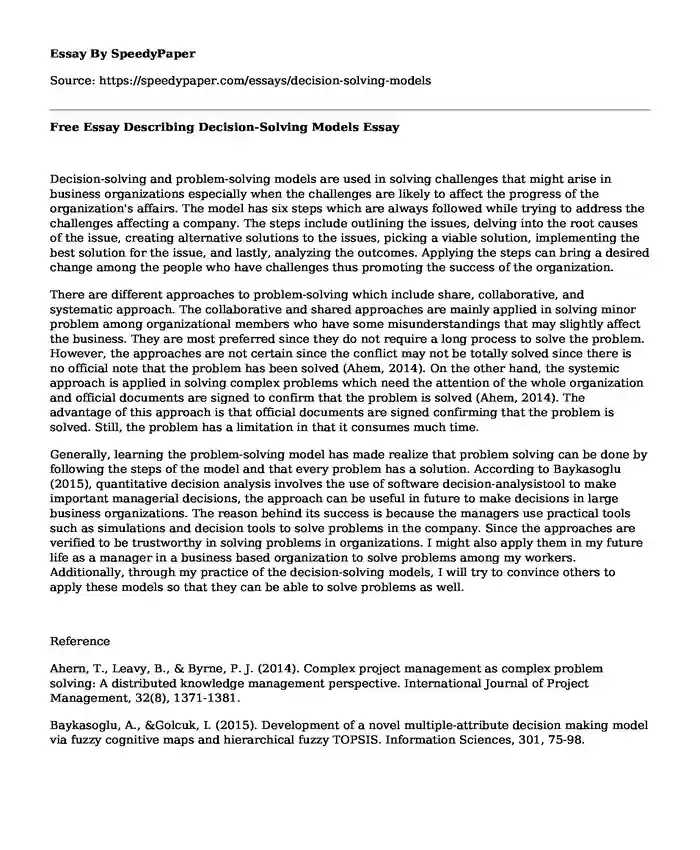
| Type of paper: | Essay |
| Categories: | Problem solving Business management |
| Pages: | 2 |
| Wordcount: | 449 words |
Decision-solving and problem-solving models are used in solving challenges that might arise in business organizations especially when the challenges are likely to affect the progress of the organization's affairs. The model has six steps which are always followed while trying to address the challenges affecting a company. The steps include outlining the issues, delving into the root causes of the issue, creating alternative solutions to the issues, picking a viable solution, implementing the best solution for the issue, and lastly, analyzing the outcomes. Applying the steps can bring a desired change among the people who have challenges thus promoting the success of the organization.
There are different approaches to problem-solving which include share, collaborative, and systematic approach. The collaborative and shared approaches are mainly applied in solving minor problem among organizational members who have some misunderstandings that may slightly affect the business. They are most preferred since they do not require a long process to solve the problem. However, the approaches are not certain since the conflict may not be totally solved since there is no official note that the problem has been solved (Ahem, 2014). On the other hand, the systemic approach is applied in solving complex problems which need the attention of the whole organization and official documents are signed to confirm that the problem is solved (Ahem, 2014). The advantage of this approach is that official documents are signed confirming that the problem is solved. Still, the problem has a limitation in that it consumes much time.
Generally, learning the problem-solving model has made realize that problem solving can be done by following the steps of the model and that every problem has a solution. According to Baykasoglu (2015), quantitative decision analysis involves the use of software decision-analysistool to make important managerial decisions, the approach can be useful in future to make decisions in large business organizations. The reason behind its success is because the managers use practical tools such as simulations and decision tools to solve problems in the company. Since the approaches are verified to be trustworthy in solving problems in organizations. I might also apply them in my future life as a manager in a business based organization to solve problems among my workers. Additionally, through my practice of the decision-solving models, I will try to convince others to apply these models so that they can be able to solve problems as well.
Reference
Ahern, T., Leavy, B., & Byrne, P. J. (2014). Complex project management as complex problem solving: A distributed knowledge management perspective. International Journal of Project Management, 32(8), 1371-1381.
Baykasoglu, A., &Golcuk, I. (2015). Development of a novel multiple-attribute decision making model via fuzzy cognitive maps and hierarchical fuzzy TOPSIS. Information Sciences, 301, 75-98.
Cite this page
Free Essay Describing Decision-Solving Models. (2022, Sep 22). Retrieved from https://speedypaper.com/essays/decision-solving-models
Request Removal
If you are the original author of this essay and no longer wish to have it published on the SpeedyPaper website, please click below to request its removal:
- Professional Goals Essay Samples
- Free Essay with a Critique of Early Childhood Play
- Factors That Affect the Level of Political Corruption: Paper Example
- Free Essay Sample on Indigenous Education in Australia
- Favorite Form of Social Media - Free Essay Example
- What Characterizes a Good Research Argument According to Greene and Wise Beliefs? Essay Sample
- Essay Sample on Healthcare Quality Benchmarking
Popular categories




